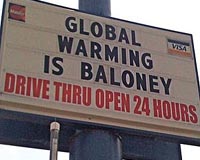| . |  |
. |
Brussels (AFP) April 27, 2011 There will be no binding deal on emissions at this year's UN climate summit as the South African hosts and other economic powers are simply "not ready," the United States and Europe said on Wednesday. "It is not a necessary thing to have right away," top US climate official Todd Stern said after European Union counterpart Connie Hedegaard admitted hopes of a breakthrough pact in Durban are already dead. "The good news is that there is a general recognition of the necessity of a legally-binding agreement," EU climate action commissioner Connie Hedegaard said. "The bad news is no legally-binding agreement deal will be done in Durban." The pair spoke after a two-day meeting of the so-called Major Economies Forum on Energy and Climate (MEF), a gathering of the world's 17 largest economies aimed at advancing efforts to cut greenhouse emissions, increase the supply of clean energy and mitigate global warming. Stern said discussion focused on whether the UN summit would even articulate the goal of a legally-binding agreement "in the coming years." "In a nutshell, our view is it would have to include all the major players -- China, India, Brazil, Russia, South Africa," he said, underlining that powerful states such as these are "not ready to have international, legally-binding obligations." "I'm not even criticising that," he added, noting that China's rise, both as a major economic power and emitter, has also seen Beijing become one of the world's top developers of clean energy. With US ratification also "a big hill to climb," a reminder that Washington did not pass the existing UN Kyoto Protocol, Stern argued that much can still be achieved even when agreements are not legally-binding. He cited commercial international relations from post-World War II through to the 1995 formation of the World Trade Organization, insisting the WTO's predecessor "GATT wasn't legally-binding." The key issue for participants ahead of Durban is how to bring timid agreements reached in Cancun, Mexico last December "to life," Stern said, especially getting a 'green fund' for investing in renewable energies "from paper to money flowing." The UN climate process almost collapsed in a more ambitious effort 12 months earlier in Copenhagen, Denmark. Stern stressed that it was too early to tell if a retreat from nuclear energy following the post-quake accident in Japan would make states less likely to commit to ambitious emissions-reduction demands. He hinted, though, that shipping and aviation, major sectoral polluters along with farming on a global scale, were likely to be given more time to negotiate their own deals. The International Maritime Organisation and the International Civil Aviation Organisation "are the right venues" for tackling the reliance on so-called bunker fuels, he said, although nations would seek to integrate these industries in the "relatively near term."
Share This Article With Planet Earth
Related Links Climate Science News - Modeling, Mitigation Adaptation
 Democrats and Republicans increasingly divided over global warming
Democrats and Republicans increasingly divided over global warmingEast Lansing MI (SPX) Apr 27, 2011 Despite the growing scientific consensus that global warming is real, Americans have become increasingly polarized on the environmental issue, according to a first-of-its-kind study led by a Michigan State University researcher. The gap between Democrats and Republicans who believe global warming is happening increased 30 percent between 2001 and 2010 - a "depressing" trend that's essentia ... read more |
|
| The content herein, unless otherwise known to be public domain, are Copyright 1995-2010 - SpaceDaily. AFP and UPI Wire Stories are copyright Agence France-Presse and United Press International. ESA Portal Reports are copyright European Space Agency. All NASA sourced material is public domain. Additional copyrights may apply in whole or part to other bona fide parties. Advertising does not imply endorsement,agreement or approval of any opinions, statements or information provided by SpaceDaily on any Web page published or hosted by SpaceDaily. Privacy Statement |